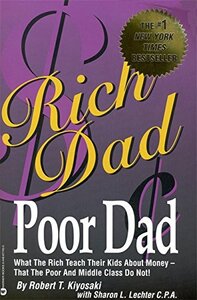You need to sign in or sign up before continuing.
Take a photo of a barcode or cover
2.04k reviews for:
Rich Dad, Poor Dad: What the Rich Teach Their Kids about Money – That the Poor and Middle Class Do Not!
Robert T. Kiyosaki
2.04k reviews for:
Rich Dad, Poor Dad: What the Rich Teach Their Kids about Money – That the Poor and Middle Class Do Not!
Robert T. Kiyosaki
adventurous
challenging
emotional
informative
inspiring
sad
fast-paced
The writing was not very good but the stuff I learnt from this book were, like, a lot. Never would like to be part of the rat race. Need to learn more finance now, I guess. If you're looking for motivation to escape the rat race, then this book is for you.
challenging
informative
inspiring
reflective
medium-paced
Thought-provoking, but that's about it.
I read this book when I was an impressionable 17-year-old freshman in uni. Of course I was blown away by Kiyosaki's core message and narrative about people mindlessly getting a degree, slaving away in their corporate jobs 'just over broke', and how nothing is an asset if it doesn't make you money.
As it turns, getting a degree and building a salaried career turned out really well for me and my husband—it had not barred but instead enabled us to have comfortable, fulfilling lives. And the message about home ownership becomes a bit tone-deaf in today's climate, well after the 2008 US housing collapse. We have family and friends whose houses bought mid-2010s have now doubled in value. If I read the book today, I would not know what to do with his message. Compelling, sure, but not practical valuable life advice.
Oh, and he made up the entire story about Rich Dad. When pressed about it in an interview, he deflected by asking if Harry Potter is real.
Kiyosaki himself had multiple business ventures go bankrupt. (He also co-wrote a book with Donald Trump.) It's not a rosy picture. Anyone wanting high rewards cultivating their own business will experience high stakes.
I think that if you want resources more in keeping in with the times, you should check out the works of Ramit Sethi and Cal Newport. Basically, increase your income by becoming valuable in what you do. Spend less than you earn. Invest. Don't go into debt. Kiyosaki's message is dangerous for people seeking wealth through entrepreneurship—that's how you get people falling prey to MLMs.
I read this book when I was an impressionable 17-year-old freshman in uni. Of course I was blown away by Kiyosaki's core message and narrative about people mindlessly getting a degree, slaving away in their corporate jobs 'just over broke', and how nothing is an asset if it doesn't make you money.
As it turns, getting a degree and building a salaried career turned out really well for me and my husband—it had not barred but instead enabled us to have comfortable, fulfilling lives. And the message about home ownership becomes a bit tone-deaf in today's climate, well after the 2008 US housing collapse. We have family and friends whose houses bought mid-2010s have now doubled in value. If I read the book today, I would not know what to do with his message. Compelling, sure, but not practical valuable life advice.
Oh, and he made up the entire story about Rich Dad. When pressed about it in an interview, he deflected by asking if Harry Potter is real.
Kiyosaki himself had multiple business ventures go bankrupt. (He also co-wrote a book with Donald Trump.) It's not a rosy picture. Anyone wanting high rewards cultivating their own business will experience high stakes.
I think that if you want resources more in keeping in with the times, you should check out the works of Ramit Sethi and Cal Newport. Basically, increase your income by becoming valuable in what you do. Spend less than you earn. Invest. Don't go into debt. Kiyosaki's message is dangerous for people seeking wealth through entrepreneurship—that's how you get people falling prey to MLMs.
The book starts with a few pieces of common sense advice about how people:
1) buy things they can't afford, i.e.: keeping up with the Joneses
2) that only lose value, i.e.: liability vs assets
3) and don't realize they're digging the hole deeper, i.e.: buying a bigger house just because you got a raise at work
The remaining few hundred pages of print are filled with repetitive utter nonsense:
1) vague self-help Yoda-ism, e.g.: don't work for your money, make your money work for you
2) oddly contradictory bragging about how awesome and rich the author is, e.g.: starting new income streams to buy a Rolex or Porsche
3) extremely bad tax advice on setting up corporations
You'd be better off watching the SNL sketch "Don't Buy Stuff".
1) buy things they can't afford, i.e.: keeping up with the Joneses
2) that only lose value, i.e.: liability vs assets
3) and don't realize they're digging the hole deeper, i.e.: buying a bigger house just because you got a raise at work
The remaining few hundred pages of print are filled with repetitive utter nonsense:
1) vague self-help Yoda-ism, e.g.: don't work for your money, make your money work for you
2) oddly contradictory bragging about how awesome and rich the author is, e.g.: starting new income streams to buy a Rolex or Porsche
3) extremely bad tax advice on setting up corporations
You'd be better off watching the SNL sketch "Don't Buy Stuff".
informative
medium-paced
informative
inspiring
medium-paced
challenging
informative
inspiring
lighthearted
reflective
fast-paced
informative
reflective
medium-paced
informative
slow-paced



